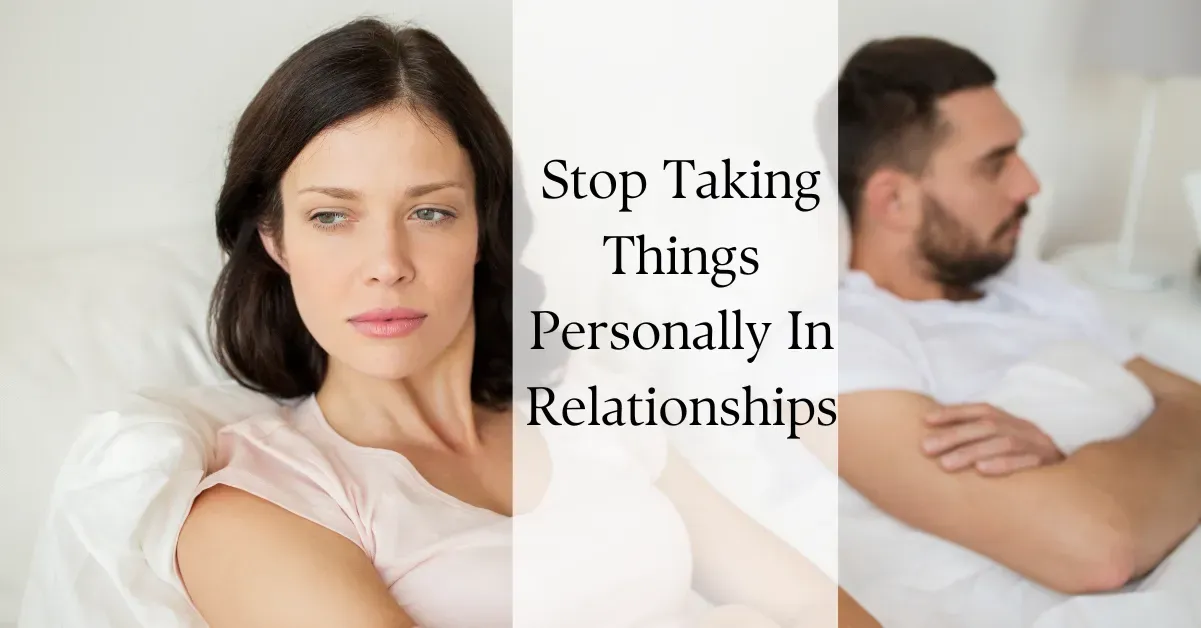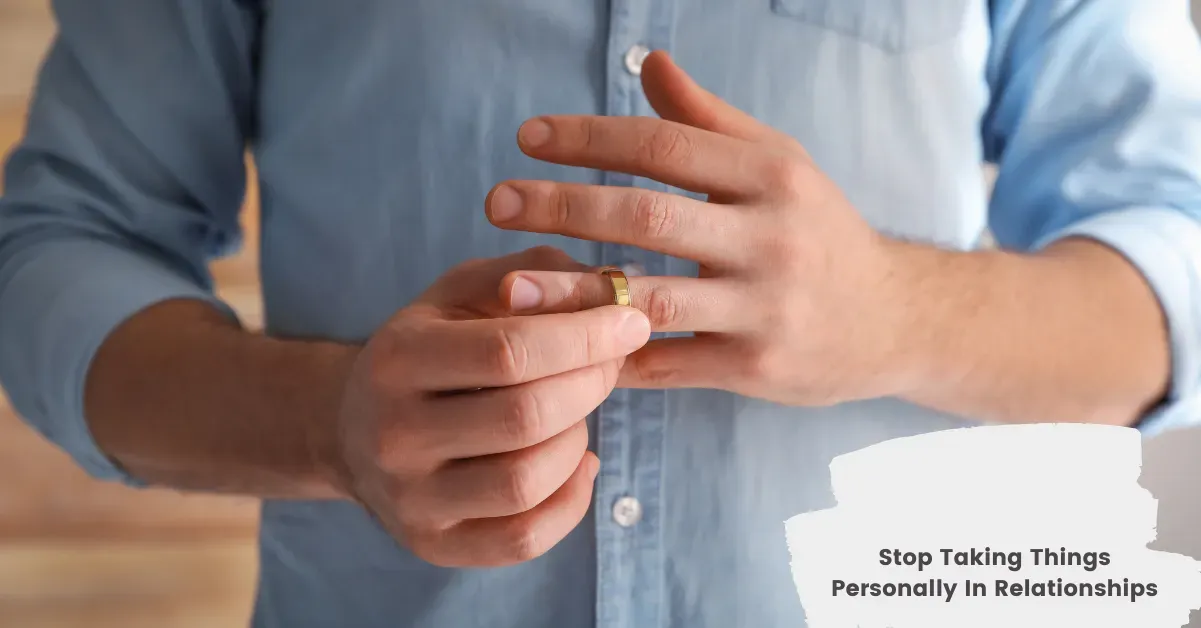Nine Practical Ways To Stop Taking Things Personally
How To Stop Taking Things Personally In Relationships
Understanding the Impact:
Realize that taking things personally can lead to stress, anxiety, and strained relationships. It's important to address this habit for your well-being.
Recognize that (getButton) #icon=(link) #color=(#2339bd) #text=(taking things personally can hurt your emotional well-being, relationships, and overall happiness). It's essential to address this habit for your own mental health.
Recognize that (getButton) #icon=(link) #color=(#2339bd) #text=(taking things personally can hurt your emotional well-being, relationships, and overall happiness). It's essential to address this habit for your own mental health.
Recognizing Triggers and Patterns:
Pay attention to situations or comments that trigger your emotional reactions. Are there recurring themes or patterns? Identifying these can help you be more aware.
Pay close attention to situations or comments that trigger your tendency to take things personally. Are there recurring themes or specific people who tend to affect you in this way? Identifying patterns can help you become more self-aware.
Pay close attention to situations or comments that trigger your tendency to take things personally. Are there recurring themes or specific people who tend to affect you in this way? Identifying patterns can help you become more self-aware.
Practicing Self-awareness and Mindfulness:
Mindfulness techniques, such as deep breathing or meditation, can help you stay present in the moment and detach from negative emotions tied to personalizing situations. Engage in mindfulness exercises like meditation or deep breathing. These practices can help you stay present in the moment, enabling you to respond to situations more objectively rather than emotionally.
Developing a Growth Mindset:
Understand that mistakes and criticism are growth opportunities, not personal attacks. Embrace challenges as chances to learn and improve. Understand that criticism, mistakes, or negative comments are not personal attacks. Instead, view them as opportunities for growth and learning. Embrace challenges as chances to improve and develop resilience.
Building Emotional Resilience:
Strengthen your emotional resilience by focusing on your strengths and past successes. Remind yourself of your ability to overcome difficulties. Strengthen your emotional resilience by reminding yourself of past successes and your ability to overcome difficulties. Focusing on your strengths can boost your confidence and make it easier to handle situations without taking them personally.
Setting Healthy Boundaries:
Clearly define your personal boundaries and communicate them to others. Knowing your limits can prevent you from internalizing external issues.
Setting healthy boundaries involves defining your personal limits and communicating them to others in a respectful way. It's about recognizing what you are comfortable with and what you are not, and then asserting those limits. When you struggle with taking things personally, having clear boundaries can be transformative. It allows you to create a safe space for yourself where you decide how you want to be treated.
To set healthy boundaries effectively, start by identifying areas where you feel you need them the most. It could be in your personal relationships, at work, or in social situations. Once you've identified these areas, communicate your boundaries assertively but kindly. Remember, boundaries are not about building walls; they're about creating healthier connections.
Negative thoughts often contribute to taking things personally. Reframing is the process of changing your perspective on a situation. Instead of automatically assuming the worst, challenge those negative thoughts. Ask yourself if there's an alternative explanation or if you are jumping to conclusions.
For example, if someone cancels plans with you, instead of thinking, "They don't like me," reframe it to, "They might have a valid reason unrelated to me." Reframing helps you see situations in a more balanced light and reduces the likelihood of feeling personally attacked.
Setting healthy boundaries involves defining your personal limits and communicating them to others in a respectful way. It's about recognizing what you are comfortable with and what you are not, and then asserting those limits. When you struggle with taking things personally, having clear boundaries can be transformative. It allows you to create a safe space for yourself where you decide how you want to be treated.
To set healthy boundaries effectively, start by identifying areas where you feel you need them the most. It could be in your personal relationships, at work, or in social situations. Once you've identified these areas, communicate your boundaries assertively but kindly. Remember, boundaries are not about building walls; they're about creating healthier connections.
Reframing Negative Thoughts:
Challenge negative interpretations of situations. Ask yourself if there's an alternative explanation that isn't personal.Negative thoughts often contribute to taking things personally. Reframing is the process of changing your perspective on a situation. Instead of automatically assuming the worst, challenge those negative thoughts. Ask yourself if there's an alternative explanation or if you are jumping to conclusions.
For example, if someone cancels plans with you, instead of thinking, "They don't like me," reframe it to, "They might have a valid reason unrelated to me." Reframing helps you see situations in a more balanced light and reduces the likelihood of feeling personally attacked.
Practicing Self-compassion and Self-care:
Treat yourself with the same kindness and understanding you offer others. Engage in self-care activities that promote well-being.
Self-compassion involves treating yourself with the same kindness and understanding that you would offer to a friend. It means acknowledging that everyone makes mistakes, has flaws, and faces challenges. When you make a mistake or experience criticism, respond to yourself with self-compassion rather than self-criticism.
Self-care is equally essential. Taking time to nurture your physical and emotional well-being is a powerful tool against taking things personally. When you prioritize self-care, you build emotional resilience, making it easier to handle situations without feeling personally wounded.
Self-compassion involves treating yourself with the same kindness and understanding that you would offer to a friend. It means acknowledging that everyone makes mistakes, has flaws, and faces challenges. When you make a mistake or experience criticism, respond to yourself with self-compassion rather than self-criticism.
Self-care is equally essential. Taking time to nurture your physical and emotional well-being is a powerful tool against taking things personally. When you prioritize self-care, you build emotional resilience, making it easier to handle situations without feeling personally wounded.
Cultivating Empathy and Understanding:
Put yourself in the other person's shoes. Understand that their actions or comments might not be about you, but rather reflect their own experiences and emotions.
Empathy is the ability to put yourself in someone else's shoes, to understand their feelings and perspectives. Cultivating empathy can help you recognize that people's actions and words are often more about their own experiences and emotions than about you. When you understand where others are coming from, it becomes easier not to take their actions personally.
Practice active listening when interacting with others, and ask open-ended questions to understand their point of view better. By focusing on empathy and understanding, you can reduce the knee-jerk reaction of taking things personally and build healthier relationships based on compassion and mutual respect.
Empathy is the ability to put yourself in someone else's shoes, to understand their feelings and perspectives. Cultivating empathy can help you recognize that people's actions and words are often more about their own experiences and emotions than about you. When you understand where others are coming from, it becomes easier not to take their actions personally.
Practice active listening when interacting with others, and ask open-ended questions to understand their point of view better. By focusing on empathy and understanding, you can reduce the knee-jerk reaction of taking things personally and build healthier relationships based on compassion and mutual respect.
Remember, it takes time and practice to change this habit. Be patient with yourself as you work towards not taking things personally. Each step you take will bring you closer to a healthier and more resilient mindset.


.webp)


